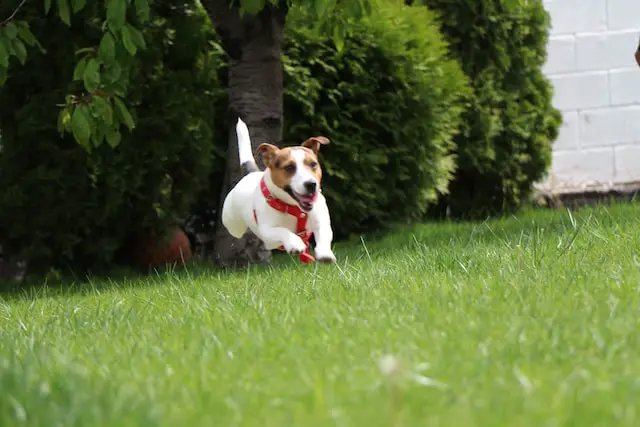Why do Jack Russells bite so much? Insights and Solutions

Jack Russells, known for their energetic nature and boundless enthusiasm, are beloved companions for many dog lovers. However, one common issue that owners of Jack Russells often encounter is their propensity to bite. This biting behavior can be puzzling and concerning, leading many to wonder why Jack Russells bite so much.
In order to understand this behavior, it’s important to delve into the innate characteristics and instincts of this breed. Jack Russells were originally bred as working and hunting dogs, known for their tenacity and determination. These instincts, deeply ingrained in their genetic makeup, can manifest as nipping or biting behavior.
Another contributing factor to their biting tendency can be attributed to a lack of proper socialization. Socialization plays a crucial role in shaping a dog’s behavior and temperament, helping them navigate the world with confidence and ease. When Jack Russells are not adequately exposed to various people, animals, and environments during their critical socialization period, they may resort to biting as a defensive response when faced with unfamiliar situations or stimuli.
Moreover, fear and anxiety can also contribute to their biting behavior. Jack Russells, like any other breed, can experience fears and anxieties that range from loud noises and unfamiliar surroundings to separation anxiety and fear of strangers. When confronted with these stressors, biting can be an instinctive way for them to protect themselves or assert control over a situation they perceive as threatening.
Resource guarding is another aspect that may lead to biting behavior in Jack Russells. This occurs when dogs feel the need to protect their possessions, such as food, toys, or even their owners. When a Jack Russell perceives a potential threat to their resources, they may resort to biting as a means to defend what they consider theirs.
Furthermore, a lack of proper training and boundaries can contribute to biting problems in Jack Russells. Without consistent training and clear guidelines, they may not understand appropriate behaviors or learn alternative ways to communicate their needs or concerns. This can result in resorting to biting as a form of communication or defense.
Lastly, health issues should not be overlooked when exploring the reasons for biting behavior in Jack Russells. Pain or discomfort caused by underlying medical conditions can lead to defensive or reactive biting as a way to protect themselves from further discomfort.
In conclusion, there are several factors that contribute to why Jack Russells bite so much. Their instinctual traits, lack of socialization, fear and anxiety, resource-guarding tendencies, lack of training and boundaries, as well as potential health issues, can all play a role in their biting behavior. Understanding these underlying reasons is crucial in addressing and managing biting problems in Jack Russells, ensuring a safe and harmonious relationship between these spirited dogs and their owners.
Instinctual Traits
Jack Russells possess a remarkable set of instinctual traits that have been honed through generations of selective breeding. These traits, while beneficial in their original working and hunting roles, can contribute to their tendency to bite.
One key instinctual trait of Jack Russells is their strong prey drive. Bred as fearless and relentless hunters, they have an inherent desire to chase and capture small animals. This prey drive can translate into nipping or biting behavior when they perceive quick movements or small objects resembling prey-like behavior. It is important to recognize that this behavior stems from their natural instincts and is not necessarily a sign of aggression.
Another instinctual trait is their high energy level. Jack Russells are known for their boundless energy and enthusiasm. If not adequately exercised or mentally stimulated, they may become restless or frustrated. This pent-up energy can manifest as biting behavior as a way to release their excess energy or seek attention from their owners.
Additionally, Jack Russells possess a strong sense of independence. This independent streak can make them more prone to assertiveness and may result in nipping or biting when they feel their boundaries are being challenged or when they perceive a need to establish control over a situation.
Furthermore, their intelligence and problem-solving abilities contribute to their biting tendencies. Jack Russells are highly intelligent dogs and possess a natural curiosity to explore their environment. However, when they encounter situations that they find puzzling or challenging, they may resort to biting as a means of problem-solving or exerting control.
Understanding these instinctual traits is crucial in managing and redirecting their biting behavior. Providing ample physical and mental stimulation, as well as engaging them in appropriate games and activities, can help satisfy their natural instincts and reduce their inclination to bite. Additionally, implementing positive reinforcement training methods that focus on redirecting their energy and reinforcing desired behaviors can be highly effective in curbing their biting tendencies.
By recognizing and addressing the instinctual traits that drive their biting behavior, owners can create a more balanced and fulfilling environment for their Jack Russells, promoting a healthier and happier bond between pet and owner.
Lack of Socialization

Proper socialization is crucial for all dogs, including Jack Russells, to develop appropriate behaviors and coping mechanisms. Unfortunately, a lack of socialization is often a contributing factor to why Jack Russells may bite frequently.
During the critical socialization period, which typically occurs between 3 and 14 weeks of age, dogs form positive associations with various people, animals, and environments. This exposure helps them become well-adjusted and confident individuals. However, if a Jack Russell does not receive adequate socialization during this period, they may become fearful or anxious in unfamiliar situations, leading to a heightened likelihood of biting.
Without early and ongoing socialization, Jack Russells may perceive new people, animals, or environments as potential threats. This lack of exposure can result in heightened fear responses, causing them to resort to defensive behaviors such as biting to protect themselves or establish a sense of control.
Furthermore, insufficient socialization can hinder a Jack Russell’s ability to appropriately interact with other dogs. Without positive experiences and guidance, they may develop poor communication skills and struggle to interpret social cues. This can lead to reactive behaviors, including biting, during encounters with other dogs.
To address a lack of socialization, it is important to gradually introduce a Jack Russell to various people, animals, and environments in a positive and controlled manner. This can be achieved through structured socialization classes, supervised playdates with well-behaved dogs, and exposure to different stimuli such as sights, sounds, and surfaces.
By providing ample socialization opportunities, owners can help their Jack Russells build confidence, develop appropriate social skills, and reduce the likelihood of biting behaviors. Remember, patience, consistency, and positive reinforcement are key when working to overcome a lack of socialization and promoting positive interactions for your Jack Russell.
Fear and Anxiety
Fear and anxiety can be significant contributing factors to why Jack Russells may exhibit frequent biting behavior. Like any other breed, Jack Russells can experience a range of fears and anxieties that can trigger their defensive response.
Loud noises, such as thunderstorms or fireworks, are common triggers for fear in dogs, including Jack Russells. The sudden and unpredictable nature of these noises can startle them and elicit a fear response, which may manifest as biting. Additionally, unfamiliar environments or situations can also induce fear and anxiety in Jack Russells, leading to defensive behaviors.
Separation anxiety is another prevalent issue that can contribute to biting. Jack Russells are known for their strong bonds with their owners, and when they are left alone for extended periods, they can experience intense anxiety. This anxiety can result in destructive behaviors and, in some cases, biting as a way to cope with their distress.
Fear of strangers is another potential trigger for biting behavior. Some Jack Russells may exhibit a wariness or fear of unfamiliar people, especially if they have not been properly socialized. When faced with a perceived threat, they may resort to biting as a means of self-defense or to protect their owners.
Addressing fear and anxiety in Jack Russells requires a patient and understanding approach. Providing a safe and secure environment, along with positive reinforcement training techniques, can help build their confidence and reduce their fear responses. Gradual exposure to fearful stimuli, accompanied by rewards and reassurance, can help desensitize them and teach them alternative coping mechanisms.
In severe cases, seeking the assistance of a professional dog behaviorist or trainer who specializes in fear and anxiety can be beneficial. They can provide tailored strategies and guidance to help your Jack Russell overcome their fears and reduce their biting tendencies.
Remember, a calm and supportive approach is vital in helping Jack Russells overcome their fears and anxieties. With time, patience, and appropriate interventions, their biting behavior can be effectively managed and minimized.
Resource Guarding
Resource guarding is a behavior exhibited by many dogs, including Jack Russells, where they display possessiveness and aggression over certain objects or areas. This territorial instinct can contribute to biting behavior when they feel their resources are being threatened.
Jack Russells may guard various resources, including food, toys, bedding, or even their owners. When they perceive a potential threat to these possessions, they may resort to biting as a way to protect what they consider theirs. This behavior can stem from a combination of innate traits and past experiences.
It is important to understand that resource guarding is a natural behavior rooted in a dog’s survival instincts. However, it becomes problematic when it escalates to aggressive behavior and poses a risk to others or the dog’s well-being.
To address resource guarding, it is crucial to establish a foundation of trust and respect with your Jack Russell. Use positive reinforcement training techniques to teach them that relinquishing resources can lead to rewards rather than threats. Gradually introduce a “trade” system where the dog learns to exchange one item for another, fostering a cooperative mindset.
Consulting with a professional dog trainer or behaviorist who specializes in resource guarding can provide valuable guidance and support. They can help create a customized behavior modification plan to address the specific guarding behavior exhibited by your Jack Russell.
Remember, when dealing with resource guarding, it is essential to prioritize safety for both your Jack Russell and others. Always exercise caution and seek professional assistance if the guarding behavior intensifies or poses a significant risk.
By addressing resource guarding through positive reinforcement, patience, and professional guidance, you can help your Jack Russell develop a more relaxed and trusting approach towards resource management, reducing the likelihood of biting behavior.
Lack of Training and Boundaries
A lack of proper training and boundaries can contribute to biting problems in Jack Russells. Without consistent guidance and clear expectations, these energetic and intelligent dogs may resort to biting as a way to communicate their needs or frustrations.
Training is essential for teaching Jack Russells appropriate behaviors and providing them with mental stimulation. Without sufficient training, they may become unruly or exhibit undesirable behaviors, including biting. Basic obedience training helps establish communication between you and your Jack Russell, fostering a mutual understanding of expectations.
Setting clear boundaries is equally important. Jack Russells thrive in an environment with structure and consistent rules. When boundaries are unclear or inconsistent, they may become confused and resort to biting as a way to test or establish their own boundaries. Consistency is key in reinforcing boundaries and teaching your Jack Russell what is acceptable behavior.
Positive reinforcement training methods are highly effective in teaching Jack Russells desired behaviors while promoting a strong bond between you and your dog. Reward-based training, using treats, praise, and play, encourages them to repeat desirable actions and discourages biting or other unwanted behaviors.
Additionally, redirecting their energy and providing appropriate outlets for their natural instincts can prevent biting. Engaging them in interactive play, puzzle toys, or activities that tap into their intelligence and energy levels helps channel their focus and reduces the likelihood of biting.
Remember, training and boundaries should be established in a firm yet gentle manner. Harsh punishment or physical corrections can exacerbate behavioral issues and undermine the trust and bond between you and your Jack Russell. Seek guidance from professional trainers or behaviorists if you encounter difficulties in training or establishing boundaries.
By investing time and effort into training and setting clear boundaries, you can significantly reduce biting incidents and foster a well-behaved and happy Jack Russell.
Potential Health Issues
Health issues can also contribute to biting behavior in Jack Russells. Pain or discomfort caused by underlying medical conditions can lead to defensive or reactive biting as a way for them to protect themselves from further discomfort.
Dental problems, such as gum disease, tooth decay, or abscesses, can be a source of constant pain for Jack Russells. When they experience oral discomfort, they may resort to biting as a defensive reaction, especially if someone touches their sensitive mouth area. Regular dental care, including professional cleanings and routine check-ups, is essential in maintaining good oral health and minimizing pain-related biting.
Skin irritations, allergies, or infections can also trigger biting behavior. Itchy or inflamed skin can cause significant discomfort, leading Jack Russells to chew or bite at affected areas. Identifying and addressing the underlying cause of the skin condition, whether it be fleas, allergies, or dermatitis, is crucial in alleviating their discomfort and reducing biting incidents.
Furthermore, certain medical conditions, such as arthritis or musculoskeletal issues, can cause pain or mobility difficulties for Jack Russells. When they experience discomfort or limitations in movement, they may become more reactive and prone to biting as a defensive response to perceived threats or attempts to handle them.
If you notice your Jack Russell displaying unusual or aggressive biting behavior, it is important to consult with a veterinarian. They can conduct a thorough examination and diagnostic tests to rule out any underlying medical conditions that may be contributing to the biting behavior.
By addressing and treating any health issues promptly, you can improve your Jack Russell’s overall well-being and minimize their inclination to bite. Remember to maintain regular veterinary check-ups and address any signs of discomfort promptly to ensure a happy, healthy, and bite-free Jack Russell.
(Note: It is always important to consult with a qualified veterinarian for proper diagnosis and treatment of any health issues your Jack Russell may be experiencing.)
Conclusion
There are multiple reasons why Jack Russells may exhibit frequent biting behavior. Their instinctual traits, such as prey drive and independence, can contribute to nipping or biting. A lack of socialization, fear, anxiety, resource guarding, inadequate training and boundaries, as well as potential health issues, can also play a role in their biting tendencies.
Understanding these underlying factors is crucial in addressing and managing biting problems in Jack Russells. By providing appropriate socialization, training, and addressing any health concerns, owners can help create a safe and harmonious environment for their Jack Russells, promoting a healthier and happier relationship between dog and owner.






